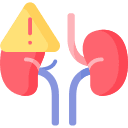(Bold for FDA approved)
 How NALMEFENE works
How NALMEFENE works• Reduces alcohol consumption through modulation of opioid systems, thereby reducing the reinforcing effects of alcohol
• Blockade of mu opioid receptors prevents the pleasurable effects of alcohol, whereas modulation of the kappa opioid receptors may reduce dysphoria associated with alcohol withdrawal
• Can begin working immediately and can be used as needed
 Notable Side Effects
Notable Side Effects• Nausea, vomiting
• Dizziness, insomnia, headache
 Life Threatening Side Effects
Life Threatening Side Effects• Confusion, rare hallucinations

unusual

not usual
• Wait
• Switch to another agent
• 18 mg/day as needed
 Dosage Forms
Dosage Forms• Tablet 18 mg
• Has been evaluated in trials for up to 1 year
• No
 Renal Impairment
Renal Impairment• Dose adjustment not necessary for mild to moderate impairment
• Not recommended for use in severe impairment
 Hepatic Impairment
Hepatic Impairment• Dose adjustment not necessary for mild to moderate impairment
• Not recommended for use in severe impairment
 Cardiac Impairment
Cardiac Impairment• Not studied
 Elderly
Elderly• Limited data available
 Children and Adolescents
Children and Adolescents• Safety and efficacy have not been established
 Pregnancy
Pregnancy• Controlled studies have not been conducted in pregnant women
• Some animal studies have shown adverse effects
• Pregnant women needing to stop drinking may consider behavioral therapy before pharmacotherapy
• Not generally recommended for use during pregnancy, especially during first trimester
 Breast Feeding
Breast Feeding• Unknown if nalmefene is secreted in human breast milk, but all psychotropics are assumed to be secreted in breast milk
• Recommended either to discontinue drug or bottle feed
Based on data Published online by Cambridge University Press
Compiled by Dr. Jash Ajmera